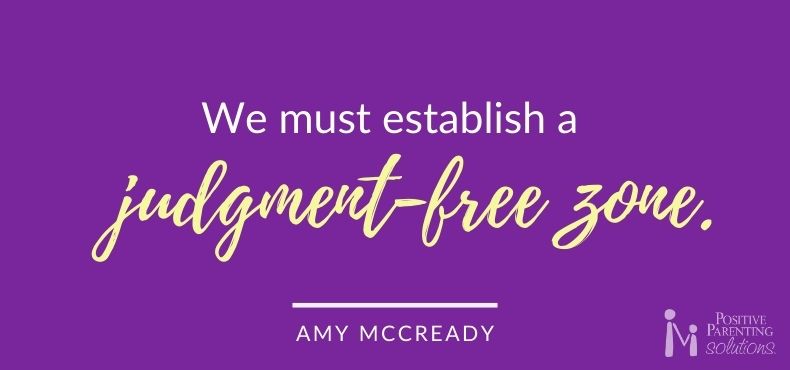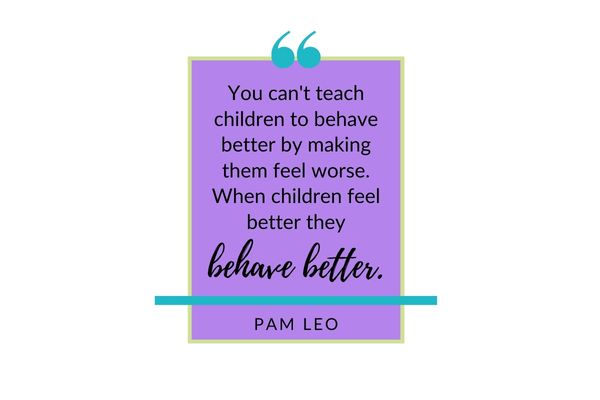No child acts completely at college 100% of the time. Not one.
So let’s ditch the labels. No extra “good kids,” “bad kids,” “troublemakers,” or “bullies.” There’s no want to categorize a toddler’s conduct.
Why? Because there are 1,000,000 variables at play, each college yr, every single day.
Still, a name from the principal bearing information of conduct issues is regarding. A instructor expressing her frustrations at a parent-teacher convention is upsetting. And seeing the outcomes of a tricky day of faculty on a toddler’s face is completely heartbreaking.
School is a spot the place kids are studying way over teachers. They’re studying to be respectful, first rate schoolmates in a shared setting. Along that path, they’re sure to stumble.
But whether or not it’s a one-off occasion or routine hassle, it’s how we deal with a toddler’s college misbehavior that impacts that baby’s self-worth and prompts much less–or additional–misbehavior. That’s why it’s so necessary to tailor our phrases and actions in direction of misbehavior appropriately and strategically.
And, ideally, by getting parents and lecturers on the identical web page.
When college misbehavior happens, right here’s the place to begin:
Stay Calm, Empathize, and Find the Root Cause
When notified about conduct points at college, some parents understandably leap into defensive mode. You know the way nice your kids are, and it’s your job to shield them. Any misbehavior at college should be justifiable.
Did one thing within the classroom immediate this disruption?
Is the instructor overreacting?
Did another child begin it, and my child took the autumn?
Other parents would possibly robotically lay full duty on their kids, believing there is zero excuse for misbehavior.
However, one of the best strategy is to collect all of the info earlier than making any assumptions.
While listening to your baby’s facet of the story, encourage them to specific their emotions and issues. Assure them you’ll pay attention with out judgment or blame.

By utilizing a peaceful voice and demeanor throughout this course of, your kids will really feel extra snug opening up to you. And, by empathizing along with your baby’s perspective–even if you happen to disagree with their actions–you’ll preserve them from turning into defensive and additional disengaging from the dialog…and presumably the reality.
Your aim proper now is to discover the foundation reason for the misbehavior with out creating an influence battle. That’s it.
Finding the supply (or sources, as there could also be a number of contributing components) proactively addresses the issue, as opposed to retroactively managing the signs.
Root causes will be surface-level. But, they’ll additionally stem from deep, unmet wants.
Psychologist and writer of The Explosive Child, Dr. Ross Greene, states, “Kids do well when they can.” So, if a toddler is struggling, there is at all times an underlying purpose for that battle and or misbehavior.
Pro Tip: For Positive Parenting Solutions members, watch or evaluation our Expert Series: The Explosive Child.
For instance, when speaking and listening to your baby, be mindful the next pertinent questions:
- How is her sense of belonging and significance within the CLASSROOM?
- Does he want extra optimistic energy within the classroom?
- Does she really feel discouraged?
- Is the instructor understanding and supportive?
- Are there different personalities within the class that conflict with hers?
- Has he been labeled as a “troublemaker?”
- Does he battle with impulse management?
- Are there consideration or studying variations?
If any of those questions will be answered with a “yes,” then it’s attainable you’ve discovered your root trigger. Or, one of many contributing causes.
So, what’s subsequent?
Pro Tip: For Positive Parenting Solutions Members, please reference our Expert Series: Keeping Our Kids Safe from Bullying
Communicate and Collaborate with the Teacher and School
Just like you’ll pay attention calmly and with out judgment to your scholar, do your finest to pay attention to a instructor or administrator with care and a focus once they notify you of misbehavior. Again, collect all the knowledge you’ll be able to and keep away from dashing to any unfounded conclusions.
If mandatory, request an adults-only assembly with the instructor or college counselor to acquire a greater understanding of the issue. This would possibly assist all events keep away from any miscommunication that may generally come up from emails or textual content messages.
During the convention, ask what the instructor wants–or doesn’t want–from you.
With all the knowledge at hand, it’s now time to work as a staff. Through open and trustworthy communication with lecturers and faculty employees, you’ll be able to develop a two-pronged plan for addressing the misbehavior. This contains each side setting clear expectations for and from each other. It additionally means remaining open to the varsity’s steering and suggestions for addressing the difficulty.
This is additionally an excellent time to speak about what you’re doing at residence to encourage the very best conduct in your baby.
Your baby’s instructor could or might not be aware of the methods you employ to proactively assist your baby. If you’ve already been profitable with sure optimistic parenting methods at residence, now is the time to share which work finest along with your baby.
Link to downloadable: Three methods to share along with your baby’s instructor and inspiring phrases for lecturers
Let the instructor know these will not be reactive methods; like making use of a band-aid after misbehavior happens. These are the optimistic parenting instruments you employ to regularly present a robust sense of belonging and significance, making your baby much less inclined to act out.
If you’re new to optimistic parenting methods, now is the time for you–and the varsity–to put a number of of the methods to efficient use.
To get began with a supercharged strategy…
Reinforce Positive Behavior (the Right Way!)
Kids who battle to meet behavioral expectations are continually being corrected and redirected. They regularly hear their names referred to as out in school and their actions scolded. At residence, they might hear comparable reprimands.
Soon, they start to imagine they’re really “bad” kids. And, guess what? Their conduct worsens.
One approach to upend this damaging cycle is to have fun and encourage a toddler’s optimistic conduct. Kids ought to hear at least as a lot optimistic reinforcement because the admonishments they obtain–if not way more!
My mentor in optimistic parenting, Vivian Brault, used this analogy:
Imagine telling your prized rose bushes, “I’ll start giving you fertilizer after you give me the kinds of blooms I know you’re capable of.”
Now, change it to parenting. “If my kids start behaving well, then I’ll give them encouragement.”
It turns into clear, now, that this retroactive strategy is doomed to fail. Positive reinforcement and encouragement should come first.
You aren’t rewarding your baby for his or her successes. Not with sweet, cash, and even reward.
Encouragement is much better; it verbally reinforces the optimistic conduct your baby shows and makes them be ok with themselves. If we’re specializing in how they’re making us really feel or providing an exterior reward as gratification, they’re going to miss the true satisfaction of self-accomplishment.
Notice the distinction, for instance, between the next phrases:
“I heard from the teacher that you’ve been talking less in class. That makes me really happy!”
Or…
“Your teacher mentioned that you’ve been working really hard on paying attention and listening to instructions. She even said it’s been helping other kids in the class focus too. You must feel so proud of how far you’ve come!
See how the focus is on how our kid must be feeling? We don’t want to condition our kids to make us, or others, feel proud or pleased. We want them to want to succeed for themselves. That’s the kind of motivation that doesn’t rely on others and the kind that lasts.
Encouraging phrases (which focus on effort and improvement) and praise (which focuses on a successful outcome) often become unintentionally intermixed. That’s why I’ve included a downloadable list of encouraging phrases in this packet that you can pass along to your child’s teacher as a quick reference. Many teachers already understand the power of encouragement versus praise, but others may be less familiar.
Link to downloadable: Encouraging Phrases for Teacher & Administrators (FREE!)
Download to share this with your child’s teacher
With this list, your child’s teacher will have go-to verbiage to pull from. And students that are acting out will go from feeling defeated to inspired.
I realize it might feel counterintuitive to encourage a child who is misbehaving. But this child is already feeling disheartened enough.
That’s why positive behavior, on any scale, should be intentionally highlighted–with zest!

Set Clear Expectations at Home Without Consequences
A common reaction to a child getting in trouble at school is the urge to discipline them at home. Because, don’t they need to learn how serious this is?
I understand your concern about your child’s classroom behavior, but, please…do not issue consequences at home for misbehavior that happens at school.
When a child misbehaves at school by pulling someone’s hair, yelling at the teacher, or escaping a classroom like she’s running for freedom, that behavior must be handled when and where it occurs. Trust that your child’s teacher has handled the situation at school according to the school’s protocol.
Applying consequences at home would only further the child’s discouragement and reinforce feelings of insignificance and resentment.
Your job at home is to show empathy–because getting in trouble was probably upsetting and embarrassing for your child–and then focus on communication and training. Help your child process what happened and discuss alternative ways he could have handled the situation. Use role play to practice how he could do or say something differently if a similar situation happens again.
Be a Positive Role Model
When considering expectations, nothing’s better than when we demonstrate the behaviors and values we wish to instill in our children. Our kids are always learning by our example!
Ensure that your home environment is nurturing and supportive. Make it a sanctuary where your child feels safe, loved, and respected.
That doesn’t mean there won’t be arguments or hard days. Nothing is perfect! Sometimes, parents yell at their kids (and each other!) and realize they have overreacted. Other days siblings are at each other’s necks, hurling hateful words, and wondering how to put each other up for adoption.
Even if families have disagreements or frustrations with one another, modeling an “I’m sorry” once we’ve achieved or stated one thing we remorse teaches kids we must always all be accountable for our actions.
When kids can switch these attitudes, actions, and emotions to college, misbehavior is destined to plummet.
Teach Kids Ways to Manage Classroom Struggles
It’s our function to present kids how to deal with conflicts and frustrations in a respectful and accountable method.
This begins by not overreacting and laying blame once we hear about misbehavior and extends to primary problem-solving expertise.
You don’t have to anticipate real-time conditions to practice kids on battle decision at residence. You can at all times co-implement two Positive Parenting Solutions® instruments: Take Time for Training and Role-Play.
These instruments assist information youngsters via pattern conflicts sure to happen in the future–or conditions which have already posed an issue–with friends and authority figures.
Maybe your daughter is struggling to sit nonetheless in her classroom when she’s supposed to be engaged on unbiased duties. At residence one night, you ask if you happen to can play the instructor whereas she performs herself in a desk chair.
You begin “teaching” a lesson, however your daughter will get up and begins working round. You say, “Hey, Carla, I know you’re getting antsy. Instead of running around the classroom, would you like to stand next to your desk and try 15 jumping jacks?
I’ll tell you what–if you do it quietly, without disrupting any other kids, I’ll let you do that anytime you feel like you have to move!”
Here comes the actually enjoyable half. YOU can now play the wiggly kiddo whereas your baby performs the instructor! Likely, she’ll repeat a lot of what you stated, and the lesson might be doubly memorable.
This is the Role-Play software, and it’s a enjoyable, non-confrontational approach to rehearse real-world problem-solving! And with the Role-Play software, you’re taking time to practice your baby what to do subsequent time!
If you give you an important resolution or two throughout this observe, be certain to share it with the instructor!
Stay Calm and Carry On
Changes at school misbehavior could not occur in a single day. It is perhaps mandatory to preserve observe of your baby’s conduct and any enhancements or setbacks by staying in communication with lecturers and faculty employees.
But be mindful throughout this course of not to mission your anxiousness onto your kids, both. We typically decide up kids who’ve been struggling at school and ask with nervous anticipation, “How was your day?? Did you get into trouble at school today?”
Our bated breath alone tells kids we’re apprehensive. They really feel our doubts of their capabilities drooping closely within the air.
Without which means to micromanage and undermine them, our questions have achieved precisely that.
Instead, whereas staying concerned in our kids’ progress, we are able to at all times assume they’ve had an important day. This assures them now we have confidence of their actions.
If they didn’t have an important day, you’ll know anyway, primarily based in your communication and rapport with the varsity employees. Just encourage lecturers to message you privately if there’s an issue. This prevents a toddler’s publicity to public, on-the-spot discussions that might additional dissolve their self-confidence.
Seek Professional Help if Necessary
Sometimes, regardless of all our greatest, mixed efforts, misbehavior stubbornly persists.
If so, there could also be underlying emotional or behavioral issues that deserve to be addressed.
Don’t let this discourage you! You can search assist from a toddler (developmental) psychologist, counselor, or therapist. Many have methods and interventions that may be tailor-made to your baby’s particular wants.
Final Thoughts
When youngsters get into hassle at college, it doesn’t imply they’re “bad.” What they really want, as opposed to admonishment, is catered care and a focus.
Because optimistic parenting thrives on techniques that enhance a toddler’s emotions of belonging and significance, it’s an important reply to misbehavior each at residence and at college. I once more encourage you and the varsity to work collectively to enact optimistic self-discipline practices.
Before lengthy, I’m assured you’ll see an unlimited enchancment in your scholar’s conduct and happiness. Because, when the thought of a “bad” child dissipates, so does the variety of their unhealthy days.
What You Should Do Next:
1. Subscribe to my Newsletter:
Sign up for my publication for parenting suggestions to enable you to create a happier residence and develop into the mother or father you at all times wished to be. Plus, if you subscribe, I’ll additionally ship you a duplicate of our strategy-packed information 10 Tips for Better Behavior – Starting NOW!
2. Register for my FREE 60-Minute Class:
Register for my free class referred to as How to Get Kids to Listen, Without Nagging, Yelling or Losing Control. Classes run a number of occasions per week to accommodate your busy schedule.
3. Enroll in my 7-Step Parenting Success System® Course
Enroll now in my confirmed 7-step system for busy parents prepared for change (it is rated 5 stars on Google). Plus, for a restricted time, save $100 on all plans—fully risk-free and with lifetime entry.
About the Author




